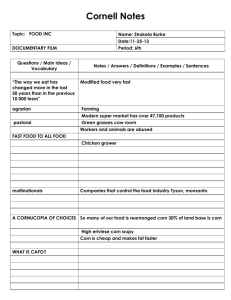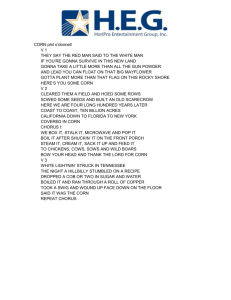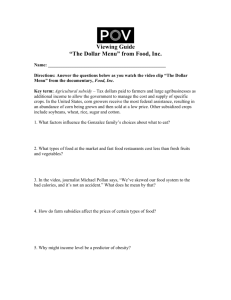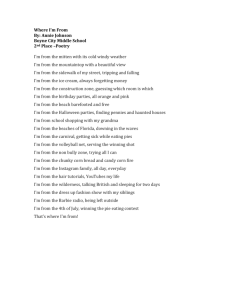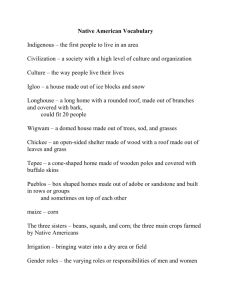experience, place, practice: corn mother and childless corn
advertisement
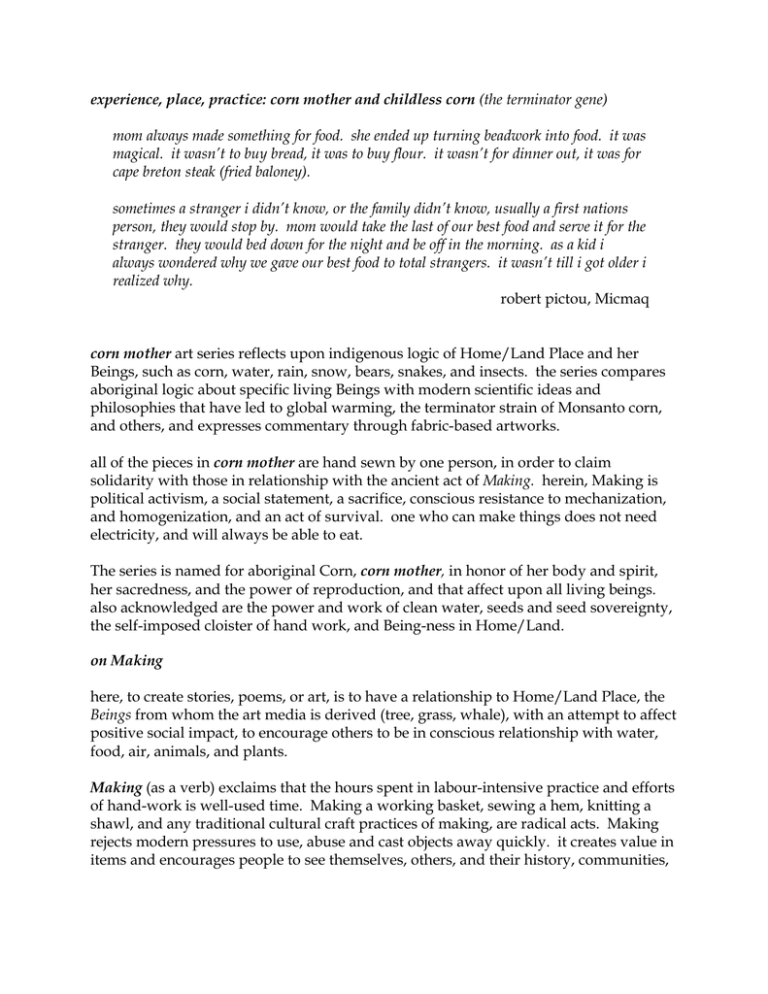
experience, place, practice: corn mother and childless corn (the terminator gene) mom always made something for food. she ended up turning beadwork into food. it was magical. it wasn’t to buy bread, it was to buy flour. it wasn’t for dinner out, it was for cape breton steak (fried baloney). sometimes a stranger i didn’t know, or the family didn’t know, usually a first nations person, they would stop by. mom would take the last of our best food and serve it for the stranger. they would bed down for the night and be off in the morning. as a kid i always wondered why we gave our best food to total strangers. it wasn’t till i got older i realized why. robert pictou, Micmaq corn mother art series reflects upon indigenous logic of Home/Land Place and her Beings, such as corn, water, rain, snow, bears, snakes, and insects. the series compares aboriginal logic about specific living Beings with modern scientific ideas and philosophies that have led to global warming, the terminator strain of Monsanto corn, and others, and expresses commentary through fabric-based artworks. all of the pieces in corn mother are hand sewn by one person, in order to claim solidarity with those in relationship with the ancient act of Making. herein, Making is political activism, a social statement, a sacrifice, conscious resistance to mechanization, and homogenization, and an act of survival. one who can make things does not need electricity, and will always be able to eat. The series is named for aboriginal Corn, corn mother, in honor of her body and spirit, her sacredness, and the power of reproduction, and that affect upon all living beings. also acknowledged are the power and work of clean water, seeds and seed sovereignty, the self-imposed cloister of hand work, and Being-ness in Home/Land. on Making here, to create stories, poems, or art, is to have a relationship to Home/Land Place, the Beings from whom the art media is derived (tree, grass, whale), with an attempt to affect positive social impact, to encourage others to be in conscious relationship with water, food, air, animals, and plants. Making (as a verb) exclaims that the hours spent in labour-intensive practice and efforts of hand-work is well-used time. Making a working basket, sewing a hem, knitting a shawl, and any traditional cultural craft practices of making, are radical acts. Making rejects modern pressures to use, abuse and cast objects away quickly. it creates value in items and encourages people to see themselves, others, and their history, communities, ecosystems, and generations in the things that they make. Making things means making family, making do, making history, and being good enough. Making, perhaps can also be called ‘time work’. it finds value in process, attained skill, and quiet intensive meditative endeavours. taking time to make, being in the sacred act of creation, means refusing time to machines, is a rejection of addictions such as gambling, video games, and sloth. committing to the practice of craft means that the old ways, traditional stories which have been handed down for many generations, still matter today, are alive and necessary to being in a healthy Home/Land ecosystem. gathering traditional materials for making means a commitment to the natural world, to do our human best to keep ourselves and out planet healthy, to practice sustainable gathering, to visit and re-visit, over generational time, spots where specific animal and plant People live. Making is a belief in all life forms as valued members of a community, and their survival is necessary to keep the community and its/our future alive. Making has helped families trade for craft items for money and food for many centuries. indeed, where there has been little or no economic development in Indian country, and poverty, the maintenance of craft work for many families meant the difference between having means to purchase food or go hungry. crafting in many aboriginal communities has meant the ability to keep food on the table or helping other purchase important items for the family and the community.
